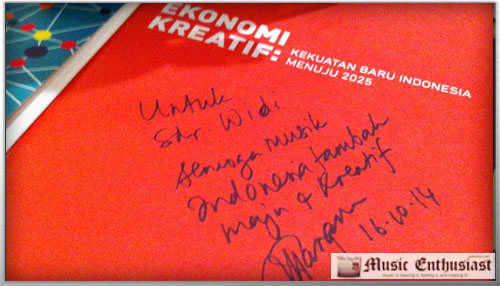
Tulisan Harvard Business Review ini sangat inspiratif. Jargon “Music as a Service” menampar industri musik yang pagi ini minta diselamatkan dengan mengundang tiap orang jadi pahlawan. Tapi, hey! Bukankah setiap saat sudah diselamatkan?
Para pengembang teknologi macam Zuckenberg, Gates dan Jobs sudah membangun sistem distribusi, menghubungkan musik, dan manusia lewat pengalaman teknologi digital. Sementara para pengusaha bisnis musik membiarkan kebingungan menggerogoti mata mereka melihat peluang yang ada dari kemajuan teknologi. Ah sudahlah! Mungkin lebih gampang menyalahkan pembajakan. Ketimbang melakukan inovasi.
Gue sebagai orang yang pernah didalam industri rekaman dan sekarang berada disisi pengguna karya rekaman sangat ingin mendorong industri ini bangkit kembali. Janganlah terus gue dicurigai dan disalahkan karena berbeda. Kita belajar dari sejarah bagaimana musik terus menerus telah menjadi bagian dari momentum kehidupan manusia. Musik selalu menjadi bagian dari pengalaman hidup. Apapun medianya, mau vinyl, kaset, CD atau digital. Musik melayani hidup kita untuk mempunyai makna lebih.
Jadi, jangan jadikan gue pahlawan buat musik. Hanya saja mari kita bergandeng tangan untuk inovasi. Pembuat konten musik, pemilik konten musik, teknokrat dan para pengembang teknologi. Agar dapat memberikan pemahaman yang sama pada tiap orang tentang hak dan kewajiban dari karya kreatif. Mempermudah urusan lisensi dengan keterbukaan informasi. Agar musik dapat tersedia luas. Agar musik tetap memberi nilai dan pengalaman bagi setiap orang. Dan tentunya buat musisi untuk tetap bisa mengambil manfaat ekonomi dari kreasinya tersebut.
Taylor Swift and the Economics of Music as a Service
https://hbr.org/2014/11/taylor-swift-and-the-economics-of-music-as-a-service
Last week we learned that worldwide music sales in Apple’s iTunes Store fell almost 14% in the past year, adding to a 2.1% decline the previous year. The culprits are streaming music services like Spotify and Pandora which enable listeners to consume as much music as they want, supported by ads or by a nominal monthly subscription. On the heels of Apple’s report, Taylor Swift announced that she would not allow Spotify to stream her newly released album (1989) and removed her entire catalog from the service. (We bet she’ll think twice about that when she realizes how much money she’s left on the table.)
The music industry has faced 40 years of disruptive technological change—the sort of business-model evolution that typifies the emerging Internet of Things. The core elements of music production and distribution have been digitized, lowering barriers to entry and transforming value creation and value capture for all participants—record companies, artists, and music distributors. The first wave of digital technologies moved the music industry from analog vinyl records and magnetic cassette tapes to plastic compact discs. But just as the music industry settled on a stable digital format, it had to grapple with a new one: the MP3, which made it possible to download music. This drove the second wave of digital transformation, as portable MP3 players became the storage and playback medium of choice. And as this new medium became fully established, it was the emergence of Napster and peer-to-peer file sharing, in 1998, that transformed music’s business model, enabling consumers to share music files for free from the convenience of their homes and cafes with just a simple internet connection. Just like Taylor Swift, the music industry buried its head in the sand and fought the trend legally, without anticipating how digitization would change their livelihood for keeps.
If even just one music company had embraced the transformation and established an internet distribution platform, their executives would be sharing conference stages with Larry Page and Mark Zuckerberg today. But none of them did, and Apple iTunes emerged from the vacuum opened by the legal shutdown of Napster to pick up the pieces as a distribution platform that could aggregate music files, make content cheap (almost, but not quite free), and simplify distribution. For the first time in business history, convenience completely replaced unique content as a barrier to entry. Apple not only inserted itself in the middle of music transactions, but also transformed the purchase dynamics by charging a single price (99 cents per song) and enabling the unbundling of musical albums. Record companies and artists were in a tailspin. The Cure and Duran Duran (and many others) saw their licensing revenues plummeting, hurried out of retirement and went back to playing live for money.
The latest wave in the digitization of music distribution has commoditized convenience, and shifted the power to upstart firms like Spotify, Pandora, and Rdio that have replaced digital downloads with direct digital streaming. The ubiquity of internet connectivity now means that consumers don’t have to download songs. Instead they can access the entire library of music on Cloud-based servers and to whatever they want whenever they want without having to purchase songs or albums. Instead, they either pay a monthly fee or put up with advertisements. Artists and record companies only get paid for the music that consumers actually listen to.
This shift to digital distribution and production has opened up a Pandora’s box of dilemmas for artists and record companies–bringing into sharp relief the tradeoff between value creation and value capture. On the one hand digital production has lowered the cost of music production substantially and has opened the door to many more musicians. The tools are so sophisticated that anyone can produce a high quality musical composition and have it available for global distribution at few clicks of the mouse. Digital technologies have unlocked tremendous value for consumers in ease of access, lowered acquisition costs, exposure to diverse musical genres, and the ability to easily share music.
However as the iTunes and Taylor Swift examples illustrate, value capture is now becoming increasingly confusing for all commercial players in the industry. Streaming music services are creating the consumer expectation that they will only pay for the frequency of listening. No longer do consumers want to build libraries or assets of music. Instead music has become a service, one that has transformed the business that once operated on the basis of acquisition (essentially a capital expense) to one based on paying only for use (an operating expense). This has ruined the industry’s previously rich economics. Companies and even platforms do not even have the ability to exploit price discrimination. Everyone gets paid the same for each stream. At least for now.
What amazes us are all the missed opportunities and mismanagement. Music is one of the key experiences in our lives, punctuating moments of great meaning and significance. What were you listening to during your first kiss? What song did you play as you danced around with your newborn baby? Why has no one had the creativity to figure out how to charge for such unique content? How can something that is so deeply important for so many of us be so completely mispriced? How can you give this away cheaper than toilet water?
In the current vacuum, power will go to platforms like Spotify that ease distribution, accumulate network effects, and enable music curation and discovery. But we believe that music is too valuable to offer on the cheap. Maybe another wave of change will create a better alternative. That idea’s not so far-fetched. Digital transformation can connect business components in unprecedented and extraordinary ways, creating new combinations and new value that can, in turn, be captured by measuring the unique outcome created. Can peer-to-peer extend to peer-to-artist? If Nest can link me to my energy company, why can’t a music service link me to my favorite artist in a (semi-) intimate performance? How much would I pay for that? If I don’t have enough money, can I crowdsource the rest? A music service should be able to price quality and uniqueness. A musician should price for the experience he or she can achieve. This chapter is waiting to be written. Taylor Swift, listen up.
